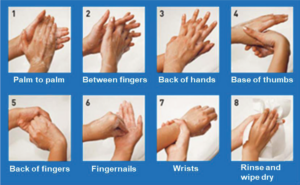What is an ESBL?
ESBL stands for Extended Spectrum Beta Lactamase. This is an enzyme (chemical) produced by some bacteria, which breaks down certain types of antibiotics.
ESBL can be produced by some strains of bacteria that normally live in the bowel, for example E. coli.
This resistance can make any infection cause by the bacteria difficult to treat.
How might ESBL affect me?
Infection from ESBL producing bacteria occurs mainly in the urine, but may also affect wounds, lungs and blood.
Sometimes these bacteria can be in your body (usually your gut) but not make you feel unwell. This is called colonisation instead of infection, as you feel well with no signs or symptoms of infection.
Am I at risk?
Most of the infections have occurred in people with other underlying medical conditions who are already very sick, and in elderly people. Patients who have been taking antibiotics or who have been previously hospitalised are mainly affected.
How is it spread?
ESBL can be spread from person to person directly or indirectly; via faecal contamination of hands and objects and then introduced into the mouth (faecal oral spread) or on the hands of patients, visitors and healthcare workers after contact with an infected patient if the hands aren’t cleaned properly.
Can I spread it to other people?
People in hospital are more at risk of injection because illness, surgery, drugs and procedures weaken their body’s defence mechanisms.
You may be transferred to a single room to help prevent spread and ensure your treatment is managed correctly.
Prevention of infection rests mainly on encouraging good hand hygiene amongst staff, patients and visitors.
Staff members do not mind if you remind them to clean their hands.
Due to the different types of infection in hospitals, it is very important that you do not visit patients in other parts of the ward or other parts of the hospital.
How can ESBL be treated?
Despite being resistant to many of the normal antibiotics, treatment options are still available if you develop infection.
If antibiotic treatment is necessary, your doctors will discuss this with you.
Make sure you wash your hands when you have used the toilet and before you eat.
Try not to touch wounds, catheters and other devices like drips.
Will I have to stay in hospital until the ESBL has cleared?
Patients do not have to stay in hospital until the ESBL has cleared. You will be able to go home when your condition allows, regardless of whether you still have ESBL or not.
How will this affect my visitors?
Visitors are asked to clean their hands on entering and leaving the ward and before helping you to eat and drink.
Hands should be washed with soap and water and alcohol gel should be used. Visitors will be advised on Personal Protective Equipment (PPE) by ward staff.
Visitors may not sit or lie on your bed. Please do not allow visitors to use your toilet.
Ask your visitors to take your dirty washing home as soon as possible and wash it in the normal way.
How will I know when the ESBL is no longer a problem?
Depending on the site of the infection, you may need a negative result.
For example if the bacteria were in your urine, you would be asked for a urine sample.
It is not known how long colonisation with ESBL persists.
What happens when I go home?
You may be discharged from hospital before your infection has cleared.
The infection will not affect your family, friends or sex life when you are at home.
Usual personal hygiene and household cleaning is sufficient.
Restriction of visitors or activities is not necessary.
How can I prevent it happening to me or others?
You can reduce the likelihood of getting ESBL by always checking that staff have washed their hands or used an antibacterial hand rub before they touch you and by washing your own hands regularly (after contact with other patients or staff, after going to the toilet and before and after eating).
What is Bedfordshire Hospitals NHS Foundation Trust doing to tackle ESBL?
We take infection control very seriously and have procedures to reduce the risk of infections happening.
Our infection Prevention and Control team are available to talk to you if you have any concerns.
All staff here are working hard to try to ensure that healthcare-associated infections are reduced so that the risk to patients is minimised.
Hand Hygiene
he role of hand hygiene can help us prevent the spread of infection.
How to wash your hands effectively with soap and water:
- Wet hands thoroughly before applying soap.
- Vigorously rub all surfaces of both hands with soap lather.
- Pay special attention to the finger tips, thumbs and between fingers (these areas are frequently missed when washing hands).
- Rinse off all the soap under running water and dry hands thoroughly.
- Always cover cuts with waterproof plasters.
- When you can, apply hand cream as this helps to prevent dryness and chapping

Where can I get more information?
If you would like further information please speak to a member of your care staff, who may also contact the Infection Prevention and Control Team for you.
The UK Health Security Agency (UKHSA) website is another source of information:
https://www.gov.uk/government/organisations/uk-healthsecurity-agency
Infection Prevention and Control contact details
You can contact the team Monday – Friday between 9am – 5pm on the following numbers:
Bedford
01234 795848
Luton
01582 497321
